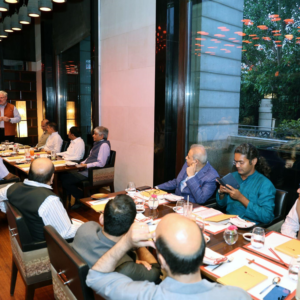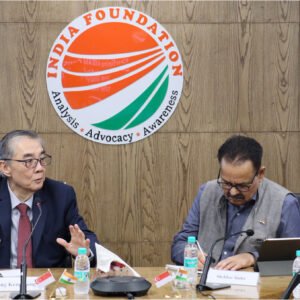Since the establishment of diplomatic relations between India and Turkey in 1948, the bilateral relations between the two countries have been generally warm and cordial. Economic cooperation is becoming an important pillar of the relationship, with both nations being among the twenty largest economies (G-20) in the world. The growth in bilateral trade between the two countries has seen a steady rise, increasing from USD 2.8 billion in 2008 when President Erdogan last visited India to USD 6.4 billion in 2017[i]. More importantly, the economies of both India and Turkey have shown remarkable stability despite volatile global economic conditions as they were based on strong fundamentals. Recent IMF[ii] and World Bank[iii]reports also show optimism about the economic prospects of both countries in the coming years.
Turkey has evinced interest in further promoting trade and economic cooperation and in broadening the overall bilateral relationship because of the huge economic opportunities that have been created under the Modi government as a result of various economic reforms and the thrust on transformational changes in the Indian economy. The numbers of high-level bilateral visits that have taken place between the two countries also point to enhancing of the bilateral relationship. In this context, the two day visit of the President of Republic of Turkey, Mr. Recep Tayyip Erdoğan to India from April 30 to 01 May, 2017 assumes significance. The Turkish President was accompanied by five Cabinet Ministers — Minister of Foreign Affairs, Minister of Economy, Minister of Energy, Minister of Culture & Tourism and Minister of Transport, Communication and Maritime Affairs. Besides these ministers, Chief of General Staff, Parliamentarians and Senior Officials also accompanied the President. This was indicative of the thrust of his visit.
PM Modi and President Erdogan agreed to encourage business efforts to achieve a level of at least USD 10 billion by 2020 in bilateral trade[iv]. Potential and opportunity to enhance the volume of bilateral trade exists through trade and FDI inflows, technology tie-ups and cooperation on various projects. In the last few years, participation of Turkish companies in India has increased significantly. This has come specifically through investment in blue chip Indian companies and FDI route, although such cooperation has remained confined only in SMEs (small and medium enterprises)[v]. President Erdogan’s visit has now opened a new chapter in the economic and commercial interactions of both the countries.
In the bilateral interactions of PM Modi and President Erdogan, both countries laid emphasis on people-to-people contact and strengthening cultural linkages. The ties of culture and language – the Sufi traditions, the exchanges and influences of the Turkish language on Hindi and vice versa, among other linkages, provide a deep connect between people of both countries. The new Cultural Exchange Programme signed between two nations will further cement the cultural connections and institutional relations. Several bilateral agreements and institutional mechanisms such as Joint Economic Commission (JEC) at the governmental level as well as in business-to-business (B2B) provide the framework for strengthening economic and commercial ties.
On the issue of terrorism, PM Modi and President Erdogan reiterated their strong condemnation of terrorism in all its forms and manifestations, and declared that there could be no justification for terrorism anywhere. The joint statement on the issue reflected India’s concerns on terrorism, and called for international efforts to disrupt terrorist networks and their financing and stopping of cross-border movement of terrorists[vi]. India and Turkey strongly condemned the use of double standards in addressing the menace and agreed to strengthen cooperation in combating terrorism both at the bilateral level and within the multilateral system. In this regard, leaders of both countries called for early conclusion of negotiations on the Comprehensive Convention on International Terrorism.
During the visit of President Erdogan to India, the following Bilateral Agreements and Memorandum of Understanding (MoUs) were signed[vii]:
- Cultural Exchange Program for 2017-2020
- MoU for Cooperation between Foreign Service Institute of India and Diplomacy Academy of Turkey
- Agreement between the Government of The Republic of Turkey and the Government of The Republic of India on Gainful Occupation for Family Members of the Members of Diplomatic Mission or Consular Post
- MoU between Telecom Regulatory Authority of India (TRAI), India and Information and Communication Technologies Authority (ICTA), Turkey
- Cooperation Agreement between Press Trust of India (PTI) and Anadolu Agency (AA) of Turkey
While convergence exists on strengthening of the economic relationship, Turkey has neither been supportive of India’s stand on Kashmir nor of India’s membership to the Nuclear Supplier Group (NSG). Turkey’s close relations with Pakistan makes it more aligned with the Pakistani position on the Kashmir issue. While Kashmir was not discussed during President Erdogan’s visit, the President had, in an interview to a local TV channel, just before he came to India, stated that the India-Pakistan dispute on Kashmir could be resolved through “multilateral talks”[viii], — a stand which flies against the principled Indian stand which speaks of bilateral resolution of the India-Pakistan dispute. In response to President Erdogan’s statement on Kashmir, India firmly drew the red line, specifically telling Turkey that Kashmir is an integral part of India and Kashmir is a “bilateral” issue between India and Pakistan and that India sees the problem of unrest in Kashmir through the crystal clear prism of “cross-border and state-sponsored terrorism” being perpetrated by Pakistan in the Kashmir Valley.
On the Issue of NSG membership, Turkey avers that it is not opposed to India’s entry to the NSG, but has linked India’s entry with that of Pakistan’s. This Turkish position is not helpful for India because it aligns with the Chinese position and only means – albeit indirectly, that Turkey doesnot support India’s NSG bid as Pakistan has little international support for its entry to the NSG, due to its appalling record of nuclear proliferation. The Turkish stand hence, in effect means a vote against India.
Turkey’s emotional and Islamist-tinged view of its relationship with Islamabad will make it difficult for a strategic compact between India and Turkey to materialize in the near future. So it is an opportune time for Turkey to de-hyphenate the India-Pakistan relations and work with India towards a comprehensive economic partnership, which could in future transform to an advanced political and strategic relationship. Turkey has great opportunities to invest in India’s expanding market of automotive and auto parts, textile machinery, chemical industry, jewellery (precious metals and stones), glass and glassware products, leather products, electrical equipment and electronics & construction materials. Turkey is a pioneer in the construction sector. Turkish construction and engineering companies have established their business globally.
In India, the construction sector will remain buoyant due to increased demand from real estate and infrastructure projects. Construction activities contribute more than 8% of India’s GDP. Turkish companies can invest in the construction development in residential, retail, commercial and hospitality sectors. Providing technologies and solutions for smart sustainable cities and building integrated townships in India is a great opportunities for Turkey to replicate the excellent construction work they have done in their own country. Training and skill development of construction sector workers is another area where the expertise of Turkey can be helpful in realising the dreams of PM Modi’s Skill India vision.
On the other hand, India’s expertise in Information & Communications Technology solutions, Space Technology and Service Sector etc. can be used by Turkey. Such cooperation will further strengthen the economic and commercial bonding and will provide an environment for greater understanding between the two countries.
In the energy sector, India and Turkey are both energy deficient and energy needs of both nations are ever increasing. In this context, the visit of Turkish President to India will certainly help in increasing the cooperation in hydrocarbon sector and in the solar and wind energy sector which are common area of interest for both countries. For example, IOT Infrastructure & Energy Services which is a joint venture between ‘Indian Oil Corporation’ and ‘VITO Energy and Investment of Turkey’, has been successful in formation of a joint tank farm at the Star Refinery (near Izmir) in Turkey.
President Erdogan,in an article published in Times of India, said “vision to guide the exemplary relations between India and Turkey, will emerge through the increase of contacts and interaction between our peoples”. Prime Minister Modi, while addressing the India-Turkey Business Summit, rightly laid out the agenda of bilateral relation and said that “Let us work together for enhancing the level of our economic activities for welfare of our people”. As both countries have global and regional aspirations towards achieving a combined objective of development and security, cooperation can be a means to achieve the above objectives.
(Siddharth Singh is Research Fellow with India Foundation)
[i] http://mea.gov.in/press-releases.htm?dtl/28428/
State_visit_of_President_of_Turkey_to_India_30_April_to_01_May_2017
[ii] http://www.worldbank.org/en/publication/global-economic-prospects
[iii] http://www.imf.org/en/Publications/GFSR/Issues/2017/03/30/global-financial-stability-report-april-2017
[iv] http://mea.gov.in/bilateral-documents.htm?dtl/28433/IndiaTurkey_Joint_Statement_during_
the_State_Visit_of_the_President_of_Turkey_to_India_30_April_to_1_May_2017
[v] http://pib.nic.in/newsite/PrintRelease.aspx?relid=161416
[vi] http://mea.gov.in/bilateral-documents.htm?dtl/28433/IndiaTurkey_Joint_Statement_during_
the_State_Visit_of_the_President_of_Turkey_to_India_30_April_to_1_May_2017
[vii] http://pib.nic.in/newsite/PrintRelease.aspx?relid=84692
[viii] http://www.wionews.com/world/exclusive-india-pak-both-have-right-to-aspire-to-nsg-erdogan-15068



